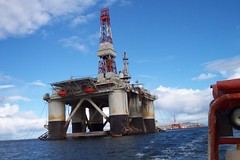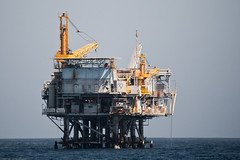I just read the financials of Basic Energy Corporation a couple of days ago and I was quite curious in the inherent risks that oil companies face in this business (I am talking about drilling wells, exploration, etc and not oil stations we normally see in our places.)
 |
| http://www.flickr.com/photos/94299816@N00/5848576484 |
Drilling oil is a risky business. Even if you find an oil deposit, it will not guarantee you that it can be commercially extracted. Also, the cost of exploration and drilling will cost you a fortune. That is why most of the companies bidding for oil exploration contracts from the government normally forms a joint venture to lessen the burden of the drilling costs. Aside from that, oil companies will normally invite a foreign investor to pay for all the drilling costs in exchange for a certain percentage of the oil profits if it is commercially viable.
However, if you find a gusher, an area rich with oil, it can top up the cost you have incurred in the previous drilling.
I would like to share this to everyone which can also be access in www2.pse.com.ph.
Here you go.
In the Oil and Gas and Geothermal Operations, the Company is faced with the following risks, in order of importance:
(a) Probability of Exploration and Development Success. Oil and gas exploration and geothermal projects are inherently high-risk undertakings. There can be no assurance that the Company's activities will be successful in discovering commercially viable oil and gas reservoirs and/or a viable geothermal resource. Even if an apparently feasible resource is determined, there is no guarantee that it can be economically exploited. Despite the Company's reliance on advanced technology such as 3-D seismic data to improve the probability of success of discovery, oil and gas exploration and geothermal is still a speculative business. Advanced technology, even with the correct interpretation, only assist geologists in identifying subsurface structures and does not ensure the certainty of the presence of hydrocarbons if drilled. Moreover, 3-D seismic data and other advanced technology require higher investments that may result in higher losses, should the drilling prove unsuccessful.
Risk of heavy financial losses if prospects would prove unsuccessful could be mitigated through:
Farm-Out of Interest. A Farm-Out Agreement is a contract whereby a third party agrees to acquire from a licensee an interest in a production license and the corresponding operating agreement for a consideration normally comprising of an undertaking to perform a specified work obligation in the drilling of one or more wells. Farming out is usually undertaken by the seller of interest as a source for funding or as part of the rationalization of a licensee's interests. The seller may want to dispose of areas or interests which are peripheral to its main operations or in which it has small equity holdings but would take up as much management time as a larger holding.
Spreading Exploration Risks through Joint Ventures in Several Exploration Blocks. Forming alliances and jointly bidding for the development of a range of opportunities in oil and gas exploration and geothermal projects, mitigates exploration risks of a corporation as there is risk- sharing - the cost and responsibilities of drilling and production are spread over a number of entities. Joint ventures also enable companies to free up firms otherwise tied up in a single drilling project and enable these companies to build a portfolio of prospects.
Exploring in Geological Proven Petroleum Areas. The Company has been making investments and will continue to invest in geologically proven petroleum provinces only.
(b) Operating Hazard of Exploratory Drilling -4ctivities and Environmental Risk. Drilling operations may be delayed, curtailed or subjected to operating and technical difficulties. Unexpected drilling conditions, adverse weather conditions, unanticipated pressure or formations, equipment breakdowns, industrial and environmental accidents and other such events may occur which may have adverse effects on the Company's operations and correspondingly on its financial performance and condition. Oil and gas and geothermal exploration and drilling activities will be subject to Philippine environmental laws and regulations. Normal exploration and drilling operations involve certain operating hazards such as explosions, crate rings, well blowouts, uncontrollable flows of oil, natural gas or well fluids, releases of toxic gas, accidental leakages, formations with abnormal pressures, fires, pollution and other environmental perils and risks, any of which may subject the Company to extensive liability or loss of assets.
Operating risks in the exploration and development drilling and production phases are generally directly driven by standards in design, procurement and installation, operating procedures and contingency planning. The Company, in its investment evaluation process, considers the presence and implementation of the following measures and strategies to mitigate risk exposures: (i) hiring of technically competent staff that are adept in utilizing state-of-the-art technology and could conduct effective evaluation work; and (ii) ensuring adherence to the various environmental laws and regulations, taking into account not only local but international expectations as well.
(c) Volatility of Oil and Gas Prices and Exchange Rate Risks. Revenues derived from successful exploration and drilling activities depend on the world price of oil. The price of oil is sensitive to minor changes in the global supply and demand conditions, quality of oil, forward selling activities, domestic and foreign government regulations, environmental trends, overall global economic condition and other macroeconomic and political factors that are beyond the Company's control. Furthermore, revenues from drilling activities are pegged to the US dollar; hence, the Company is exposed to exchange rate risks given the volatility of the rate of exchange between the U S dollar and Philippine peso.
 |
| http://www.flickr.com/photos/72825507@N00/3898808431 |
(d) Government Regulations and Approvals. Government action such as changes in regulations may affect the Company's business and eventual operating and financial performance. Government may limit access to prospective development areas, implement stricter environmental laws to protect human health and the environment, impose higher taxes and royalties, all of which may adversely affect the Company's financial performance. For the risks mentioned in items (c) and (d) above, these risks could be mitigated through early identification systems of risk exposures to external threats such as changes in government regulations and changes in the geo-political environment of operating locations. The Company will also continue to negotiate oil price agreements with inputs from experts. The Company, as a member of a consortium, adheres to its policy of involving competent technical professionals in the preparation and negotiations of oil price agreements. The Company will also continue to involve competent technical professionals in the preparation and negotiations of power purchase agreements for its geothermal projects.
No comments:
Post a Comment